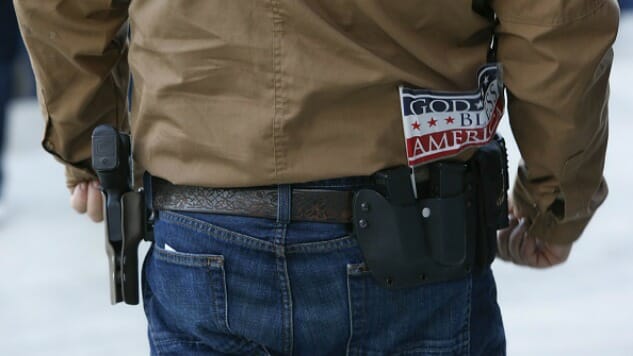Guns in the District: How the Second Amendment Could Spell Trouble for Trump Supporters at the Inauguration
Photos courtesy of Getty
There’s no definitive way to say just how many of the National Rifle Association’s five million members voted for Donald Trump this past November. However, it has been reported that the NRA contributed more than $50.3 million to seven different Republican candidates in the 2016 election, with $30.2 million allocated specifically to the Trump campaign. The latter figure is more than twice what the NRA contributed to Republican candidate Mitt Romney in 2012. With that in mind, it’s safe to say that the majority of voters who were concerned about their Second Amendment rights opted for Trump over Hillary Clinton.
However, if any of those voters are thinking about exercising those aforementioned rights on inauguration day in DC, they might want to think twice. Unbeknownst to many, the nation’s capital has some of the toughest gun laws in the country, meaning that (according to the Code of the District of Columbia ), “all non-residents are prohibited from carrying or transporting guns within the city.”
Here’s a possible scenario: Virginia is very lenient when it comes to gun ownership, and individuals aren’t required to register a firearm after purchase. So, imagine on inauguration day that a Virginia resident (we’ll call him Steve) decides to attend the inauguration and bring his gun with him. In Virginia, Steve may be allowed to carry his gun pretty much anywhere, but as soon as he crosses into DC, he’s entering a world of trouble.
Jason Kalafat, a partner with the DC law firm Price Benowitz, describes a situation he’s seen many times before: “Say this person is looking for a place to park, and ends up pulling into one of the many, many parking decks in the city. If that structure is next to a federal building, then the security personnel at the gate are going to ask if he’s carrying a firearm. Most gun owners are used to being able to carry, so they’ll answer yes. When that happens, they will immediately be arrested and taken into custody.”
There is no bail in DC, which means that Steve now has to appear before a judge. That generally takes one business day. If he’s being charged with a felony (more on that later), then a mandatory three-day hold is required. If Steve has no criminal history, he’s still looking at a court date for certain and probation at best. For misdemeanor gun violations, sentencing guidelines call for a maximum of one year in prison and a $1000 fine. For felonies, it’s 5 years in prison (possibly more depend on the circumstances) and thousands of dollars in fines.
Kalafat, a criminal defense attorney who has handled numerous firearms offenses in the District, dismissed the idea that a prosecutor might show leniency on visitors who either didn’t know the law or simply forgot that they had a gun in the car: “Ignorance of the law is not a defense. If you park in Washington and you have a gun in your possession, you no longer have federal protection. You instead fall under DC’s law, and a defense of ‘I forgot’ isn’t going to override the probable cause the prosecution will have.”
The District of Columbia has taken that same hard stance on the issue for the past 40 years.
Prior to 2008, gun ownership in DC was regulated by the Firearms Control Regulations Act of 1975, which prohibited residents from owning handguns, with the exception of active or retired police officers and those residents who were grandfathered in. However, in 2008, the U.S. Supreme Court ruled in District of Columbia v Heller (now known as the Heller Decision) that the Second Amendment of the Constitution applies to federal enclaves, and therefore protects an individual’s right to own a handgun within the District. In effect, the ruling determined the laws in DC to be in violation of the second amendment.
In response, the Council of the District of Columbia developed new restrictions aimed at limiting the possession and registration of firearms. One such provision required potential gun owners to demonstrate to the Chief of Police a “good reason to fear injury to his or her person or property, or has any other proper reason for carrying a pistol.” Since these were somewhat subjective qualifications, it was difficult (if not impossible) to receive a permit. This is more or less the situation today.
-

-

-

-

-

-

-

-

-

-

-

-

-

-

-

-

-

-

-

-

-

-

-

-

-

-

-

-

-

-

-

-

-

-

-

-

-

-

-

-











































